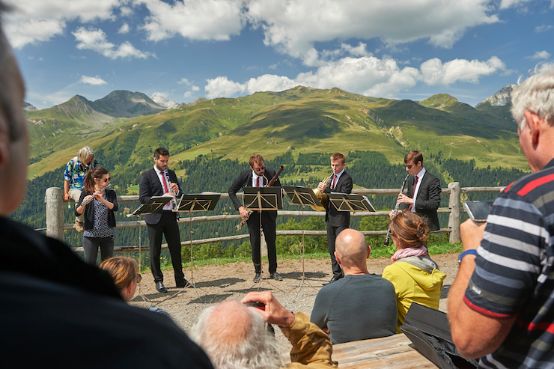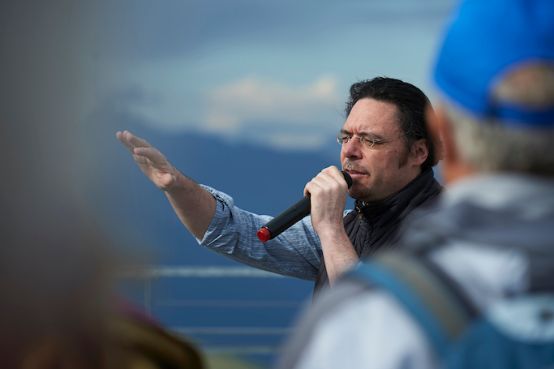Rest days in Davos
This year's Davos Festival takes place from August 4 to 18. It wanders from summit to summit, takes its time and is intertwined with stories. It is the last under the direction of Reto Bieri. A few impressions from the peaceful event.

Other festivals have an "Artist in Residence", Davos has an "Artist in Rest". This is exactly the kind of counterpoint and questioning that artistic director Reto Bieri is aiming for. He also has exactly the right person for this unique position: Patricia Kopatchinskaja. The radio asked: "When does she play?" - She doesn't play at all, but lets her violin rest. From time to time, she speaks on the festival's own radio station, Ruhe, on which "the current peace and quiet on site" can be heard: the trickling of water, barbecues on the Stafelalp, dishwashers in the Hotel Schweizerhof.
Patricia Kopatchinskaja is a phenomenon of calm for him, Bieri explains. They once played a piece together, something terribly difficult. He had practiced for half a year. When they met three days before the performance, the violinist confessed that she had not yet looked at the piece. They then went through it together, very slowly, and set it up. "Now I have to sleep," Kopatchinskaja then said. "We had hardly done anything," reports Bieri, "but when we met again in the evening, she had mastered the piece!"
This year's entire festival, entitled "Heute Ruhetag" ("Today's day of rest"), aims to track down tranquillity, or rather indulge in it. The subtitle "Young Artists in Concert" indicates what the festival has been doing since it was founded in 1986: it gives young musicians on the threshold of professional life the opportunity to work and perform in selected ensembles for two weeks.
Friends cheering you on
The last concert I hear during my stay in Davos is a matinee in St. Paul's Church. It's called "Closed today because of death" and combines works by composers who had to deal with false or even deliberately falsified death notices. For example, an arrangement of the funeral music that Cherubini wrote on the death of Haydn. However, Joseph Haydn had not died at all, but his brother. The composer let it be known: "If I had known about the ceremony beforehand, I really would have traveled to Paris." Friedrich Gulda, the eccentric composer and pianist, had forbidden obituaries and then tested whether the press would adhere to them with a false death announcement. The Geza Anda Prize winner Claire Huangci, who plays some of his short pieces with great verve, reproduces this rebellious and stubborn spirit.
I'm sitting in the gallery, surrounded by many young festival participants. They watch attentively as their colleagues play. When Thomas Reif, Ruiko Matsumoto and Michael Schöch tackle the last movement of Haydn's C major Piano Trio Hob XV:27 very quickly, a murmur goes through the rows, which turns into enthusiastic applause at the end. Because the three of them bring their breakneck speed to the finish with joy, mischief and precision.
Connecting leisure
In conversation with the person sitting next to me, I want to know what she will take home with her - apart from her musical progress. The young violinist Maria Elisabeth Köstler doesn't have to think twice: "Less is more! Both in a program and in the work." She has already taken part in various summer academies. Not only was the accommodation often precarious, she also had to rehearse and perform in five different ensembles. It was hectic and the result was unsatisfactory. Here, on the other hand, you sometimes have a day off to go hiking or make music with others. You can really get to know each other in the chamber music group. This is exactly what Reto Bieri strives for. He emphasizes that he thinks very carefully about who he wants to bring together with whom. And in the end, the audience can also sense this fine-tuning.
Contagious programs, impositions included
Köstler mentions another important experience: "How to create coherent programs in which everything relates to each other." There is indeed a lot to learn in Davos. The titles and cross-references are not just decoys in the program booklet. In the concerts, narrator Tom Tafel and Reto Bieri himself tie literature, local and world history together with the music to form plausible packages. Goethe's "Über allen Gipfeln ist Ruh" is hiked from the stone desert on the Jakobshorn to the valley - with appropriate music at every stop. Thus integrated, the audience also responds curiously to impositions, for example when the event, which is supposed to be a short echo of the hike, ends at around ten o'clock with the announcement that the concluding piano work by Morton Feldman lasts 70 minutes! Of course, not everyone stays, but it's no problem if some of the audience prefer the peace and quiet of their own homes. In the first days of the festival, Feldman's six-hour String Quartet No. 2 with the note: "Entry and exit possible at any time." Finches were available so that the public could enter quietly.
The chamber opera, which will be performed on the first weekend of the festival, is rather noisy and has already been rehearsed in advance due to the lengthy preparation time. The choice of subject matter is immediately apparent from the theme of tranquillity: Tim Krohn's episodic tale From the life of a top-quality mattress. In eight stages from 1935 to 1992, people love and play, argue and suffer on a mattress. What in the book expands into a kind of kaleidoscope of the 20th century by concentrating on small episodes does not quite succeed in Leo Dick's musical theater version of the same name. The means and techniques used are too mixed and not specific enough.
Your own enthusiasm
-

- Reto Bieri on the road with Goethe's "Über allen Gipfeln ist Ruh". Photo: © Yannick Andrea
"A festival has to grow out of the location, it has to have something to do with the place and the people, otherwise there's no point." Bieri took over the management in Davos five years ago with this conviction. That's why the festival titles are always verbal finds from the area. Even more important: the people from the village and the vacation guests should be involved. The open singing, for example, developed from this endeavor. In the beginning, only a few people came, but it has since become a popular, in some cases downright longed-for part of the festival weeks. The festival as a whole, previously perhaps more of a private event for people from the lowlands, has opened up. But as much as Bieri has the audience in mind, he doesn't see himself as a selfless mediator: "Now I'm going to say something provocative: I actually did everything just for myself! And not to be successful, but because I enjoy every little detail! I have the feeling that by doing it for myself, it can also be appreciated by others."
So why is Reto Bieri leaving after five years? "We've really made a difference here, not just me, the whole team. Now we have to manage it. New things are coming. And if I can breathe, then I'll breathe elsewhere too." From next year, pianist Olivier Schnyder will head the Davos Festival.








